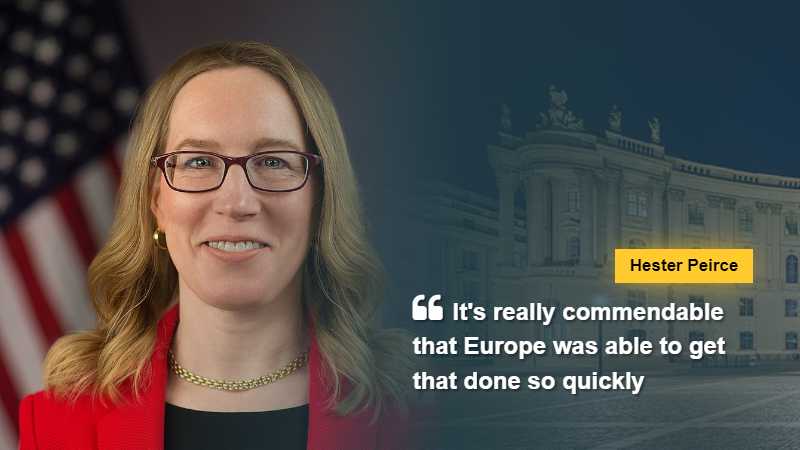
During a Financial Times conference on Wednesday, it was highlighted that the absence of a global agreement on regulations for crypto assets has resulted in a “fire hose” of various regulatory approaches. This problem has made it challenging to attract established investors, which is necessary for the cryptocurrency market to mature.
While the European Union has completed the development of the world’s most extensive regulations for crypto assets, Markets in Crypto Assets (MiCA), other countries such as the U.K. and the U.S. need to catch up.
Many regions worldwide lack comprehensive regulations for cryptocurrency companies beyond adhering to anti-money laundering and anti-terrorist financing laws.
“If we built a good regulatory regime, people would come. I think you will see that with MiCA. We are shooting ourselves in the foot by not having a regulatory regime in the U.S.,” said U.S. Securities and Exchange Commission commissioner Hester Peirce.
The U.S. Commodity Futures Trading Commission (CFTC) is also looking into the cryptocurrency derivatives market, as the need for more explicit regulations becomes more urgent following the collapse of the crypto exchange FTX last year.
Agreeing with the notion, Eva Gustavsson, the head of public affairs at crypto firm Copper, said that the E.U. regulations will likely become the global standard for cryptocurrencies unless alternative legal frameworks are established.
Gustavsson also emphasized that the influx of global regulatory proposals could overwhelm businesses, making it unrealistic for companies to achieve compliance soon.
Sarah Pritchard, the executive director for supervision at the U.K.’s Financial Conduct Authority, agreed with the demand for global regulatory consensus in the crypto industry.
She mentioned the importance of establishing global standards and promoting harmonization whenever feasible. This viewpoint was expressed amid calls from crypto firms for a unified international approach to regulation rather than a flood of disparate rules.
According to Pritchard, IOSCO, a group that oversees securities regulators worldwide, is expected to release proposals for global policies soon. Gustavsson added that greater regulatory clarity would encourage more conventional institutional investors to participate in the cryptocurrency market, thereby fostering its development.
“It’s really commendable that Europe was able to get that done so quickly.”
Hester Peirce, Commissioner on U.S. Securities and Exchange Commission
EU’s MiCA: A regulation landmark the U.S. can follow
The EU’s MiCA regulation represents a landmark development in crypto regulations that could serve as a model for the U.S. MiCA introduces novel regulations and standards for individuals and organizations engaged in crypto-assets issuance, trading or services within the EU.
The legislation includes anti-money laundering (AML) and data protection measures. It also introduces more rigorous regulations for stablecoins. Starting in July 2023, the EU will enforce groundbreaking crypto regulations under the MiCA framework. The legislation will gradually implement certain provisions taking effect by January 2025.
MiCA also requires that crypto service providers adhere to rigorous standards to protect investor funds and establish accountability. These include operating with integrity, impartiality and expertise while ensuring adequate security measures. Service providers must maintain a minimum level of funds and obtain a license from a regulatory body in any one country to provide their services throughout 27 EU member states.
Moreover, MiCA mandates cryptocurrency issuers to generate a white paper that provides prospective investors with information about the token. This paper must be released before the asset is offered to the public and serves a similar function to the prospectus that a firm produces before selling its shares to the public on a stock exchange.
